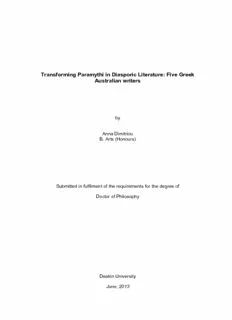Table Of ContentTransforming Paramythi in Diasporic Literature: Five Greek
Australian writers
by
Anna Dimitriou
B. Arts (Honours)
Submitted in fulfilment of the requirements for the degree of
Doctor of Philosophy
Deakin University
June, 2013
Acknowledgements
I am indebted to all of my supervisors who have mentored, guided, inspired, criticised
and patiently directed me on this journey.
I acknowledge the initial direction that I had from Dr Wenche Ommundsen, who was
my first principal supervisor, while at the School of Communication and Creative
Arts at Deakin University.
I thank Associate Professor Frances Devlin-Glass, who accepted to be my principal
supervisor after Professor Wenche Ommundsen undertook new responsibilities at the
University of Wollongong. I am especially grateful that Frances remained with me
even after she retired. Without her guidance and commitment, I could not have
completed this thesis.
I am indebted to Dr Ron Goodrich, who was an associate supervisor in the initial
phase of this journey, and then became my principal supervisor. For his invaluable
direction, advice, encouragement and mentoring, I am truly grateful.
I acknowledge associate supervisors Dr Lynette McCredden and Associate Professor
Sudesh Mishra, and thank them for their initial observations.
I acknowledge the support of the Higher Degree Research team of the School of
Communication and Creative Arts at Deakin University. My trips to Melbourne were
i
always positive ones. I am truly indebted to the staff of the off-campus services of
Deakin University for their prompt and tireless service.
I would also like to thank all those who have listened to me and encouraged me
throughout this journey. Especial thanks go to my sister Helen Magdas, Helene
Abougiannis, Effie Williams.
Eight years has been a long time but my family, my husband John, my children and
six grandchildren, Bill, and my aging mothers have kept this journey real.
Dedicated to my mother, who taught me the Greek letters, and to the memory of my
late fathers, Kosmas and Dimitris who told many paramythia. I also dedicate this
work to my mentors in the Greek letters, Chrysoula Gotis-Graham and Vasili
Stavropoulos, who inspired me with their enthusiasm for literature, translation and
the rhythms of Byzantine Hymnology.
ii
Abstract
This thesis investigates the different ways in which paramythi, a Greek oral traditional
practice of storytelling, has been used by contemporary, diasporic Greek Australian
writers Stylianos Charkianakis, Dean Kalimnios, Antigone Kefala, Fotini Epanomitis
and Christos Tsiolkas in their literary texts. Paramythi is the specific framework that I
have used to compare how these writers negotiate cultural identity and conflicting
cultural influences. I have had to compare how my chosen diasporic writers diverge or
differ from the mainland Modern Greek writers, who also drew upon elements of
paramythi in their texts.
I draw upon Bakhtin’s idea of ‘outsidedness’ and Homi Bhabha’s concept of cultural
translation, as well as insights from feminist and cultural theorists Sneja Gunew,
Smaro Kamboureli and Stuart Hall to explore how my chosen set of writers use their
outsider position to negotiate their past and present. Paramythi in this thesis is not
examined as an ethnographical narrative trope, but as a sub-literary strategy
employed by literary writers. So, after my initial investigation into how paramythi has
been creatively used and transformed in its place of origin, my main focus is to
translate the diasporic writers’ uses of paramythi, and to interpret the varied ways in
which its traditional role has shifted. The main aspects that I focus on chapter by
chapter are: the different ways in which the writers use language; how the anti-
iii
traditional writers blend or distort the boundaries of genre; how the traditional poets
and the anti-traditional prose writers negotiate the idea of home; and how each writer
represents their emerging sense of selfhood. The varied ways that each writer is
positioned in relation to their heritage indicates that paramythi represents Greekness
in contestatory ways
iv
Table of Contents
GLOSSARY viii
CHAPTER ONE
Introduction: How do Greek Australian writers use and transform
the paramythi and why? 1
What is significant about this research? 3
Towards a methodology for studying the use of paramythi in
Greek Australian texts. 12
How did I come to this research? 31
CHAPTER TWO
Defining paramythi 34
Features of Greek myth 51
What is paramythi? 62
CHAPTER THREE
Deployment of Paramythi by Modern Greek Writers 74
George Seferis 81
Odysseus Elytis 96
George Sarantaris 102
The non-traditionalists: Nikos Gatsos, Miltos Sachtouris and
Andreas Embirikos 108
v
CHAPTER FOUR
Searching for One’s Voice through Paramythi 119
The language question in the Antipodes 123
Charkianakis and Kalimnios: their relationship to language
and Hellenism 126
Charkianakis’ relationship with his predecessors 139
Kalimnios’ relationship with his predecessors 151
Antigone Kefala’s relationship to language 165
Concluding remarks on language use 176
CHAPTER FIVE
Blending and Distorting Genre: The Anti-traditionalists
Christos Tsiolkas and Fotini Epanomitis 181
What genres are these writers using? 194
Epanomitis’ feminist magical realism 202
Tsiolkas’ blending of the oral into literary form 212
Epanomitis’ and Tsiolkas’ use of the Carnivalesque 220
How Tsiolkas and Epanomitis differ in the way they bend
and blend paramythi 226
Conclusion 233
vi
CHAPTER SIX
Home, Belonging and Not-Belonging 236
Nostalgia for the ancestral homeland 238
Women writers: shifting boundaries representing home 246
‘Non-territorial, essentialised belonging,’ or ‘the desire for
somewhere else’ 250
The anti-traditionalists: differences and points of intersection
between them 260
CHAPTER SEVEN
Representation of Identities Through Paramythi 276
Changing modern Greek Identity politics and Diaspora 284
The diasporic identity: the poets and Hellenistic continuity 293
The female writers: journeys towards self-consciousness 311
Tsiolkas’ anti-traditional tale 317
CHAPTER EIGHT
Conclusion 324
BIBLIOGRAPHY 343
vii
Description:writers Stylianos Charkianakis, Dean Kalimnios, Antigone Kefala, Fotini . imaginary tale and has parallels with fairytales, folk tales, the fantastical,.

